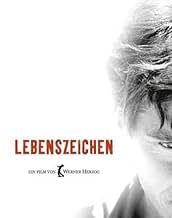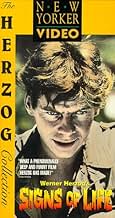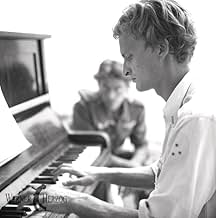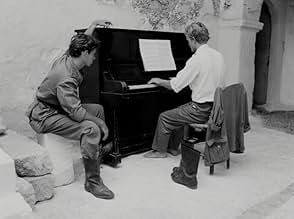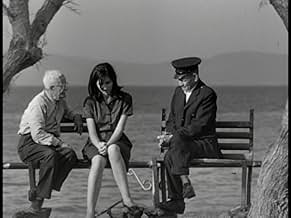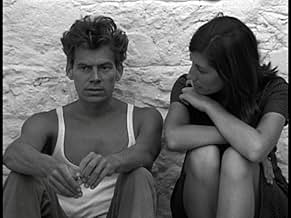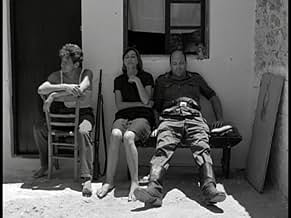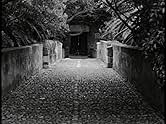AVALIAÇÃO DA IMDb
7,0/10
2,6 mil
SUA AVALIAÇÃO
Adicionar um enredo no seu idiomaThree wounded soldiers are removed from battle and given the task of looking after a fortress in a small coastal town. However, the pressures of isolation begin to take their toll on the men... Ler tudoThree wounded soldiers are removed from battle and given the task of looking after a fortress in a small coastal town. However, the pressures of isolation begin to take their toll on the men.Three wounded soldiers are removed from battle and given the task of looking after a fortress in a small coastal town. However, the pressures of isolation begin to take their toll on the men.
- Direção
- Roteiristas
- Artistas
- Prêmios
- 2 vitórias e 2 indicações no total
Werner Herzog
- Soldat
- (não creditado)
- Direção
- Roteiristas
- Elenco e equipe completos
- Produção, bilheteria e muito mais no IMDbPro
Avaliações em destaque
Signs of Life is Werner Herzog's very first feature film and also one of his best. The script may have even inspired Stephen King's novel The Shining. In Signs of Life we have an injured soldier and his wife working as the caretakers of a military fortress on a Greek island. The soldier eventually goes mad with boredom and tries to kill his wife and everyone else.
Werner Herzog wrote the award winning script in 1964 and made the film in 1967 with only $20,000 at age twenty-five with a stolen 35mm movie camera. Herzog's script is amazing and all of the actors perform flawlessly. Signs of Life has great photography and a great use of Greek music and has Herzog's distinctive slow pace which may seem like torture to the average viewer who's been forced-fed a steady diet of fast food images.
Werner Herzog wrote the award winning script in 1964 and made the film in 1967 with only $20,000 at age twenty-five with a stolen 35mm movie camera. Herzog's script is amazing and all of the actors perform flawlessly. Signs of Life has great photography and a great use of Greek music and has Herzog's distinctive slow pace which may seem like torture to the average viewer who's been forced-fed a steady diet of fast food images.
I guess it should come as no surprise that there are no more than 8 reviews on IMDb about this film. The comfortably habitual Hollywood formula, which in so many ways as found itself in far more than Hollywood pictures, makes it hard for people to appreciate works such as this. This movie premiers Herzog's love for pictures and his rare ability to search them in the most mundane environments-a picture of a statue's foot embedded in the wall, a car slowly crossing a dancing road over a hill disappearing and appearing, two grown man entertained by the mysterious motion of the ears of a small owl toy figure...the list goes on forever.
It tells the story of a soldier who, after being wounded, is sent to recover in a small and peaceful Greek island where he and 3 others are ordered to care for a fort. That reveals itself a boring job and as time passes, the mundane days start slowly removing the sanity from the soldier. The story of a soldier gone mad is hardly novelty, but in Lebenszeichen the soldier goes mad from boredom and the location seems to be the cause of that and that's why we are shown the quiet little island. And it seems Herzog wants us in quiet observance of this routine, just so that he can slap us awake by the impending insanity of the character. My favorite scene is when we observe a landscape of windmills, which is usually used to portray a sense of quietude and peace, and over the hill, on the background of the picture, in small size, we see the soldier losing his mind, waving around like a madmen as if he was being tortured. That duality seems to display the despair in a higher note.
This is not an easy movie to understand and interpret, because it hides more than it shows, it indicates more than it reveals, it searches as much as it offers. Its a beautiful movie and while its not as great as some of Herzog's best efforts, it is certainly worthwhile and memorable.
PS: another reviewer seems to offer the idea that the movie might have been influenced the Stephen King's "The Shinning", but the film predates that novel by 9 years.
It tells the story of a soldier who, after being wounded, is sent to recover in a small and peaceful Greek island where he and 3 others are ordered to care for a fort. That reveals itself a boring job and as time passes, the mundane days start slowly removing the sanity from the soldier. The story of a soldier gone mad is hardly novelty, but in Lebenszeichen the soldier goes mad from boredom and the location seems to be the cause of that and that's why we are shown the quiet little island. And it seems Herzog wants us in quiet observance of this routine, just so that he can slap us awake by the impending insanity of the character. My favorite scene is when we observe a landscape of windmills, which is usually used to portray a sense of quietude and peace, and over the hill, on the background of the picture, in small size, we see the soldier losing his mind, waving around like a madmen as if he was being tortured. That duality seems to display the despair in a higher note.
This is not an easy movie to understand and interpret, because it hides more than it shows, it indicates more than it reveals, it searches as much as it offers. Its a beautiful movie and while its not as great as some of Herzog's best efforts, it is certainly worthwhile and memorable.
PS: another reviewer seems to offer the idea that the movie might have been influenced the Stephen King's "The Shinning", but the film predates that novel by 9 years.
10manjits
I first saw this film in 1969 in Bangalore (India) in a German film festival. The film was unheralded, being the first feature from an unknown director. However, the film made an everlasting impression on me, and I considered it among 2 or 3 of the best films I had seen till then. I kept track of Werner Herzog films ever since, and have been seeing them all I could lay my hands on. Even today, I'll put it as among the 10 best films I have ever seen, and it remains my favorite Herzog movie. The film is sheer poetry. It's a film about 3 characters'(2 soldiers and wife of one of them) boredom in an isolated Greek island, and how each one handles it. While one of the soldiers snaps up at the end, and tries to destroy everything in his impotent fury - managing only to kill a donkey ultimately - the second soldier keeps himself and first soldier's wife sane by just being raucously funny. I found the story, direction, camera-work and acting fascinating,and far from boring, as suggested by some reviews. I believe, Herzog has been influenced by India's Satyajit Ray in his style of presentation. He is one of the 3 most uncompromising film directors of the world in last 50 years, the other 2 being Ingmar Bergman and Robert Bresson, and his first feature is among his best.
into a strange culture, in this case WW II German soldiers occupying a Greek island, three of them recuperating in an ancient fortress while a Nazi garrison is billeted in the town below. Herzog captures the exotic setting with brilliant photography, and at the same time the strangeness not only of culture clash but ultimately of the war itself. Intense Greek music on the soundtrack and the crystalline sunlight bring a sharp focus on the madness that comes to inhabit Stroszek's mind, the madness of seeing through what has been done in the name of the fatherland. Herzog's first major film is as much political meditation as it is psychological travelogue.
Signs of Life is one of the purest cinematic experiences in the history of film. For those unused to slow moving, simple stories the movie will probably seem painfully dull. The first time I saw it I was nearly driven crazy by the pace. It was my first Herzog movie and I was unused to movies that operated outside the Hollywood formula. But that feeling of going crazy is exactly what Herzog is trying to bring you to understand. He gets inside the boredom of his principal characters so that you viscerally understand what they are going through. When one of them finally snaps -- you understand. The visual poetry of this film will live with me forever. Herzog more than any director alive understands that a picture is worth a thousand words.
Você sabia?
- CuriosidadesWerner Herzog's first feature film. Often regarded as a pioneer of New German Cinema, his films often feature ambitious protagonists with impossible dreams, people with unusual talents in obscure fields, or individuals in conflict with nature. In 1961, when Herzog was 19, he started work on his first film Herakles. He has since produced, written, and directed over 60 films and documentaries. He has also published over 12 books of prose and directed many operas. French filmmaker François Truffaut once called Herzog "the most important film director alive." American film critic Roger Ebert said that Herzog "has never created a single film that is compromised, shameful, made for pragmatic reasons, or uninteresting. Even his failures are spectacular." He was named one of the world's 100 most influential people by Time in 2009.
- Citações
Young Child: Now that I can talk, what shall I say?
- ConexõesFeatured in Was ich bin, sind meine Filme (1978)
Principais escolhas
Faça login para avaliar e ver a lista de recomendações personalizadas
- How long is Signs of Life?Fornecido pela Alexa
Detalhes
Bilheteria
- Orçamento
- DEM 25.000 (estimativa)
- Tempo de duração
- 1 h 30 min(90 min)
- Cor
- Mixagem de som
- Proporção
- 1.37 : 1
Contribua para esta página
Sugerir uma alteração ou adicionar conteúdo ausente

